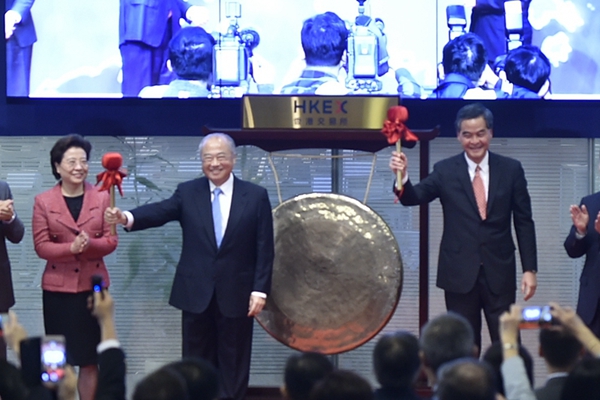
Leung Chun-ying (right), chief executive of the Hong Kong Special Administrative Region, and Chow Chung-Kong, chairman of Hong Kong Exchanges and Clearing Ltd, ring the opening bell at the launch ceremony of the Shenzhen-Hong Kong Stock Connect on Dec 5. [Photo/Xinhua]
China’s capital market will be more open, as Shenzhen-Hong Kong Stock Connect kicked off on Dec 5, the second cross-border stock market between Hong Kong and the Chinese mainland, according to Economic Daily.
Yang Tao, an expert from the Chinese Academy of Social Sciences, said Shenzhen-Hong Kong Stock Connect will improve the efficiency of cross-border capital flow. “It is a big step in two-way openness of the Chinese capital market,” he said.
Shenzhen-Hong Kong Stock Connect will not have maximum limits on transactions, with the daily northbound limit — Hong Kong traders buying shares from Shenzhen Stock Exchange — of 13 billion yuan ($1.9 billion) and southbound limit of 10.5 billion yuan ($1.52 billion).
Charles Li, chief executive of Hong Kong Exchanges and Clearing Ltd, said the mainland’s wealth can be diversified and deployed globally through Hong Kong, and the most creative and innovative enterprises in the mainland will have direct access to international capital.
The mainland capital market keeps opening up, according to Zhou Ming, chairman of China Securities Depository and Clearing Corp Ltd.
Since the beginning of the 21st century, several projects for two-way openness have been launched, such as “Qualified Foreign Institutional Investors” (QFII), “RMB Qualified Domestic Institutional Investor” (RQDII), and mutual recognition of funds between the mainland and Hong Kong. In 2014, the kickoff of Shanghai-Hong Kong Stock Connect marked the first cross-border stock market, a new model for interconnection between the mainland and overseas capital.
According to Liu Shiyu, chairman of the China Securities Regulatory Commission, a more open capital market is significant to normalized operations, its benefit to real economy and international competitiveness.
In order to protect investors’ legal rights, financial supervision institutions in the mainland and Hong Kong will work together to crack down on violations against laws and regulations, such as cross-border market manipulation, Economic Daily reported.
